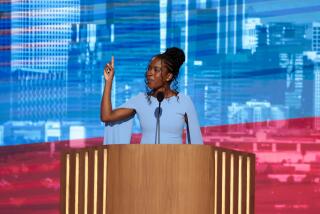Santa Monica Bus Riders See Poetry in Motion
- Share via
Gertrude Stein might have said: “A bus is a bus is a bus--but poetry on a bus is really something.”
Then again, she might not have said it quite that way. But the American expatriate poet surely would have approved of Santa Monica’s decision to turn 136 buses into vehicles for poetic self-expression.
Beginning this month and continuing until the end of the year, riders on Santa Monica municipal buses will have more to contemplate than ads for cigarettes and correspondence schools. Among the advertising that lines the upper walls inside each bus will be three placards with attractive graphic presentations of short works by contemporary poets.
Every three months the poems will be replaced by new works. In addition to having the fruits of their creative labor displayed before the bus-riding public, the 12 poets published in this unconventional way will each receive a $100 honorarium.
Nationwide Competition
The inspiration for this undertaking came not from the Muses but from the Santa Monica Arts Council, which sponsored a nationwide competition for the portable poetry.
Currently displayed aboard buses are “The Electrified World” by Stephen Rodefer of San Diego, “Alberts Landing” by Hugh Seidman of New York and “Desktop Human Rights Policy for the U.S. State Dept.” by Sesshu Foster of Alhambra.
“Our mission is to bring art to the widest possible audience,” said Henry Korn, the council’s executive director. “We’ve put sculpture and dance on the beach--why not poetry on the buses?”
Many Sponsors
The honorariums and other costs of the project were partially funded by a $4,000 grant from the National/State/County Partnership, a cooperative group comprising the National Endowment for the Arts, the California Arts Council and the Los Angeles County Music and Performing Arts Commission. The Santa Monica City Council and its Arts Commission supplied a matching grant, and the bus company donated the advertising space.
Korn, along with about 40 local poets and arts boosters, kicked off the program by boarding a special “poetry express” last Saturday. Laden with imported beer and finger sandwiches, in addition to wall-to-wall panels of poetry, the big blue bus carried the group to three parks. At each stop, eight poets disembarked to read from their works.
Against a postcard-perfect backdrop of sailboats bobbling in the bay, Arts Commission Chairman Paul Leaf introduced the poets, who stepped up in succession to a portable microphone and loudspeaker at Palisades Park, the first stop.
Bill Mohr, Eloise Klein-Healy, Ruben Martinez, Terry Wolverton and Ann Laner --all contest winners--read a poem each. Three local poets who served as judges in the competition--Max Benavidez, Michelle T. Clinton and Douglas Messerli --also recited from their work. Then everyone piled back onto the bus for Clover Park.
Small Turnout
The public readings didn’t draw much of a public. Only a handful of friends of participants showed up to form an audience. Two groups of nearby sunbathers declined even to glance up.
None of this seemed to dampen the enjoyment of the traveling poetry party. They enthusiastically applauded each other, expressing special pleasure after the reading of “The Hundredth Boyfriend,” a humorous look at sexual politics by Clinton.
Another favorite was Martinez’s untitled poem in Spanish about El Salvador. Martinez used the language in a rhythmic, sonorous way--reminiscent of Chilean poet Pablo Neruda--so that even listeners who didn’t understand the words said they were moved.
Martinez, 25, who works as a literary translator and journalist when not writing poetry, said he was impressed by the diversity of styles represented by the poets on the bus.
Wide Variety
“We heard confessional poetry, political and ethnic poetry,” he said. “And we heard people talking about what women are feeling.”
Clinton, a 33-year-old black woman, said that her verse, even when not specifically about racial subjects, “comes out in a black style.”
“It’s got a little edge--the snap, the rhythm of jazz. I hope it has,” she said, smiling.
The last stop of the day was Douglas Park. Facing a duck pond with their backs to traffic buzzing by on Wilshire Boulevard, the poets spontaneously chose their final readings from notebooks and papers they carried. Klein-Healy selected a poem about El Rescate, a Los Angeles center for Central American refugees, and Wolverton picked one about a failed love affair between two women.
No Stereotypes
Afterward, Wolverton remarked that the poets’ tone and subject seemed to defy stereotyping. “It was some of the men who read the tenderer poems and some of the women who were angry,” she said. “And an Anglo woman from Los Angeles chose to write about a Central American issue.”
Wolverton, 33, who is director of the Woman’s Building in Los Angeles, calls herself a “recovering performance artist,” having forsaken that art form a year ago.
“Performance art tended to become entertainment-oriented,” she said. “Mine was not. It was about raising consciousness. Writing was what I really wanted to do.”
Writing poetry is also what Suzanne Mork wants to do. An executive secretary who said she “discovered poetry last May,” Mork signed up for the “poetry express” after hearing about it through Beyond Baroque, a literary and arts center in Venice whose director, Dennis Phillips, served as an adviser to the project.
As Yet Unpublished
Although Mork hasn’t tried to have her work published yet--”a very scary thought”--she said the literary form is “one of the most exciting discoveries I’ve ever made.”
If other Santa Monicans are driven to discovering the joys of poetry, it won’t surprise Bob Ayer. The bus company’s assistant director is full of enthusiasm for the poetry project.
“It’s an exciting adventure,” he said. “Fifty thousand people a day will see these poems. That’s a lot of people exposed to poetry.”
More to Read
Sign up for Essential California
The most important California stories and recommendations in your inbox every morning.
You may occasionally receive promotional content from the Los Angeles Times.










